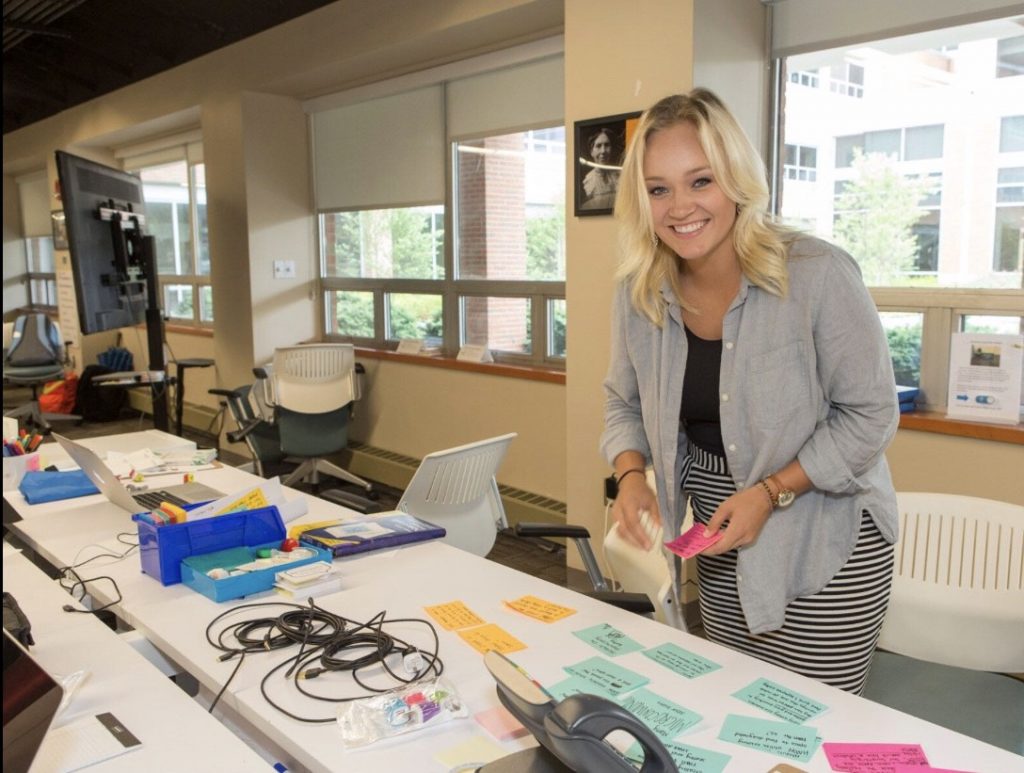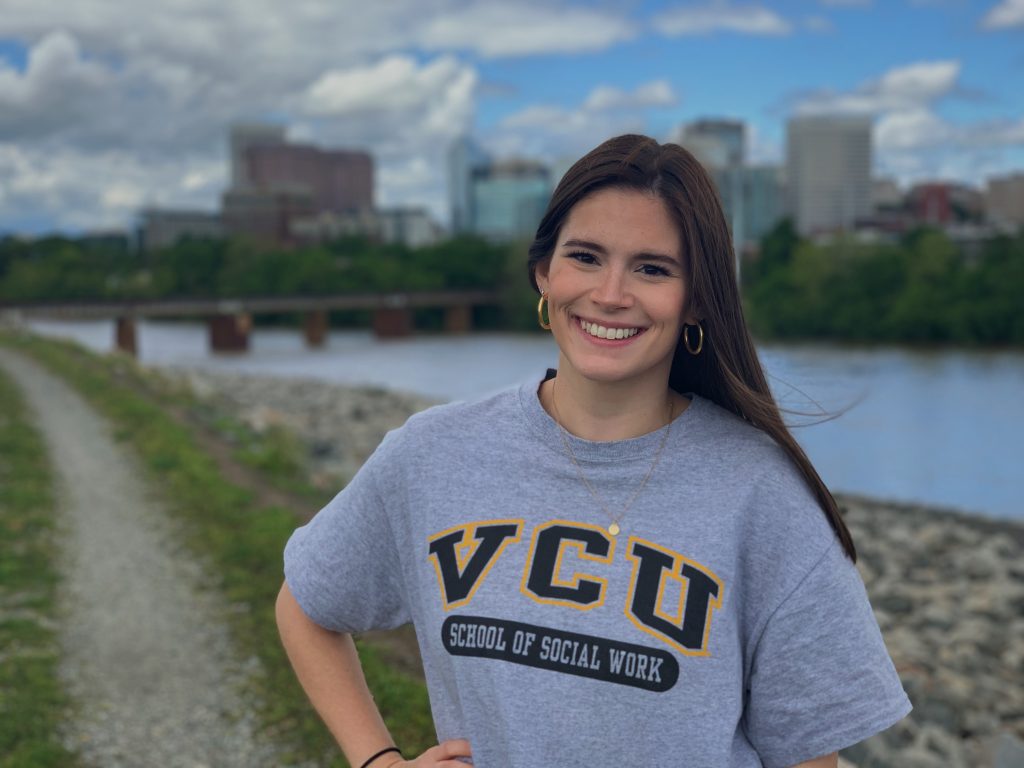‘Be adaptable’: How social work interns and their supervisors adjusted during a pandemic
As they adjusted to the evolving state of their field placements this semester, VCU School of Social Work students Cassidy Jones and Harley Jones realized they – and their profession – were built for such unstable times. Even a pandemic.
The two, who graduated May 8 with their Master of Social Work degrees, both had field placements – required internships – at VCU Health; Cassidy worked in the adult oncology clinic at Massey Cancer Center and Harley in House Call Services, a clinical program.

“It’s staying on your toes. I think that’s what social workers do all the time anyway … they’re just problem-solvers,” Harley says of adapting to the tumultuous semester.
Staying flexible was the key, Cassidy says. “There was a whole week where we had no idea what was happening in field or classes, so it’s just the ability to keep on our toes and just make it work.”
That lesson may be the most important one that social work field interns learned in an unprecedented semester interrupted by COVID-19.
“Their resiliency and ability to be fluid … if they haven’t learned anything else, they at least learned to be adaptable, to be able to walk into situations where they don’t have the answer or things change from the day to the hour to the minute. That’s social work,” says Erica Jackson, a 2014 VCU M.S.W. graduate who is a clinical social worker in acute care medicine at VCU Health and also serves as a health system field placement coordinator.
Responding to the challenge
A three-person field coordinator team facilitates the intern program between the school and the health system and oversees student learning and work. Whitney Meleski, LCSW, who works in outpatient oncology at VCU’s Massey Cancer Center, admits there was uncertainty for her team just like there was for students.
“It seemed like conditions changed twice a day for a few weeks when the virus first started presenting in mid-March,” says Meleski, a 2013 VCU M.S.W. graduate and, like Jackson, an adjunct faculty member with the school. “At first, we were like, ‘Huh, wonder how this will impact us?’ Of course, things kept progressing, and the three of us knew we needed to get a plan in place to support our students.
“We had no idea what it would look like – and no clue what our own work would look like. But we had a responsibility to students to keep this a positive experience. So we came together and brainstormed ideas, and at the same time were engaging with the field office about what the expectations would be, coming up with scenarios for learning. It was really a collaborative effort with the three of us, our leaders at the hospital and the School of Social Work.”
Both Harley Jones and Cassidy Jones praised their direct field liaison, Claudia Dillon, LCSW, an adjunct faculty member based at the school.
“Every time I reached out, I got a response, in a time where lots and lots of emails were going out,” Harley says. “She was taking the time to respond to everything. The school’s field office responded as quickly as they could.”

Says Cassidy, “I felt like they gave us information in a timely manner, and I felt prepared, I felt informed. (Claudia) was like, ‘I’m here, call me, text me. Whatever you need … I can’t imagine what you guys are going through.’ So for me, they did a great job.”
Field instructors ease transition
Both credit their field instructors – day-to-day supervisors onsite – for helping them through the semester. Mason Dimick, LCSW, and a 2014 VCU M.S.W. graduate, was Harley’s instructor; Caitlin Duffy, LCSW, and a 2015 VCU M.S.W. graduate, was Cassidy’s.
For Harley, that included a 14-day self-quarantine in March after traveling in Europe. “I was trying to make my way back and was super fortunate to have Mason on my side, saying, ‘If there’s anything I can do to help you, let me know.’ He’s a big proponent of self-care, and he was just like, ‘Take the time you need to figure out what you need to do.’ We had several conversations when I was back that went above the mandated weekly time for supervision.”
Cassidy credits Duffy for a “super smooth transition,” but regrets the loss of the direct patient contact she had as part of the oncology clinic’s outpatient services. Working remotely, she continued with supervision hours for clinical experience, heard from Duffy how she and her team have learned to work from home and took online training for oncology care.
“I’m just realizing you can do it at home,” Cassidy says. “Initially, there’s a lot of, ‘I’m not going to be able to do that.’ And then you realize, ‘Oh, I can; there’s a way to do that.’ And I feel like for our profession, that’s going to hold strong and we’re going to see some changes.”
COVID-19’s mental health impact
While neither worked directly with COVID-19 patients as interns, they did see firsthand the impact of the anxiety and stress triggered by the crisis.
“I’ve talked to a lot of patients who are breaking down because they’re just scared to be in a medical setting, they’re scared they have to be around potential germs,” Cassidy says. “Everyone being cooped up at home and just the constant changes, it’s created a lot of need for mental health resources.”
The need for social workers in health settings is crucial, the new graduates say.
“In oncology, we’ll see people who just got diagnosed (with cancer) and they are super emotional and have information packets with all these giant words and they don’t understand what any of it means,” Cassidy says. “Our job is to break it down and see what they do understand, talk to the doctors, and then the doctor will work that out with us, and we’ll go back to the patient and explain in easier terms: ‘This is what it means and this is the path you’re looking at.’ ”
Jackson emphasizes the need for clinical social workers to help vulnerable populations.
“Social workers are definitely needed during these times,” she says. “We want to be experts in the mental health area. People are definitely feeling pressure, particularly those suffering homelessness, who may have a communicable disease and they’re not even able to go to the shelter. The irony is ‘shelter in place,’ but the (homeless) shelter is their shelter, and they don’t have that any longer.”
Meleski has seen the toll social isolation takes on cancer patients.
“Our patients at the hospital are struggling because they can’t have visitors,” she says. “You have patients in oncology that have been in the hospital for months. What has that done to their mental status and their motivation to recover? How is it going to impact patient outcomes for years to come?”
Social work: A force for recovery
She also sees social work’s future evolving as it becomes a vital component in the COVID-19 recovery.
“There’s going to be a lot of work-related trauma, the trauma this has caused in the family setting and with individuals,” she says. “It’s going to have such an impact on the profession for a long time. We’re going to be the helpers and the ones called in to help patients and clients pick up the pieces … or maybe when the pieces aren’t even there.
“New systems are being created. It’s mind-blowing. The virus has uprooted our society. Social workers have the tools to put it back together again.”
That outlook also gives hope to Harley Jones.
“We were already in a very intense point of our grad career, in the final crunch, finishing up projects, many of which were group projects,” she says of the arrival of COVID-19. “I think it made us much better team members. I think that will help us transition into the working world and working on actual teams, especially if we’re hired right now and are going to launch right into what’s already happening in the world. I think it will make us more prepared.
“I’ve had a lot of people talk about how the economy will be rough, and it’s going to be hard to find a job, but we need social workers now more than ever. These aren’t the means by which we want to be so employable, but I believe social workers will be some of the most necessary facets of the health system.”
Categories Community, Education, Students